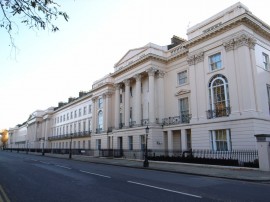
Trade union leader Dave Prentis was on the radio this morning, while up to 2 million public sector workers are on strike protesting at cuts to their pensions, criticising the government’s approach to sorting out the public finances. Why should the poorest bear such a share of the burden? There are other people who can afford to contribute more.
Last year, he said, the richest 1 per cent of the population saw their wealth increase by 30 per cent. They should pay more.
There are two problems with this argument, meaning that it would probably generate less revenue that Dave Prentis hopes. The first is that, although the richest people are very rich indeed, there are not many of them. The chart below shows that roughly half of the UK’s income tax receipts come from the top 10 per cent of earners, and the other half comes from the middle 80 per cent. To increase tax revenues substantially means levying higher taxes not merely on the richest people but also on quite a lot of averagely-paid people too.
The second problem is that the rich will avoid a lot of the higher taxation, which in turn increases the burden falling on the average. The rich can avoid those taxes because they can move their assets and their transactions offshore: the cost of doing this makes it only worthwhile for the rich and not for the average tax payer.

As an example of this tax avoidance, consider the stamp duty on homes. Taxes on property are often thought to be a good idea because it is hard to avoid them. Unlike income, you cannot pretend that it is not there. However, the ownership of property can be shrouded in legal complexity and the relevant tax becomes either legally or practically uncollectable.
In the case of stamp duty, which is levied on the sale of a residence, this is dodged by means of an offshore company. The home is owned by a company based in a tax haven, and not by the individual who lives in it; rather than selling the house, one sells the company; as far as the land registry is concerned, nothing has changed and so no tax is due. It costs money to set up and maintain a company in the Cayman Islands or somewhere like that for the purposes of owning a home, so only the most expensive houses will avoid tax this way. The result is that more is paid in tax on the sale of a house worth less than £1 million than on the sale of a house worth more than that. This is a scandal, thanks to the offshore world of tax havens.
The starting point for any demand that the rich pay more in tax is to eliminate the baleful effect of tax havens on tax collection. As far as the Cayman Islands or the Isle of Man is concerned, how it hosts companies and levies taxes on them is a matter of Caymanian or Manx national sovereignty. As far as the rest of the world is concerned, that national sovereignty – and everyone’s national sovereignty – cannot be applied to tax systems if we want those tax systems to be fair.

